

LEAKED: Redmond not allowed to sell 'Nokia' smartphones after 2015. Integrated tiered storage for Big Data and HPC Microsoft has 18 months left to use the Nokia brand name on its smartphones and mutant Androids, according to leaked notes prepared for internal marketing guidance.
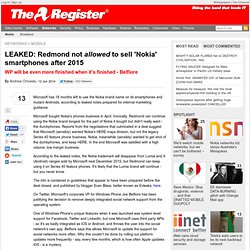
Microsoft bought Nokia's phones business in April. Ironically, Redmond can continue using the Nokia brand longest for the part of Nokia it bought but didn't really want - the dumbphones. Reports from the negotiations that culminated in a deal suggest that Microsoft (sensibly) wanted Nokia's HERE maps division, but not the legacy Series 40 feature phone business. Nokia, meanwhile (sensibly) wanted to get shot of the dumbphones, and keep HERE. According to the leaked notes, the Nokia trademark will disappear from Lumia and X (Android) ranges sold by Microsoft next December 2015, but Redmond can keep using it on Series 40 feature phones. Belfiore also confirmed that Windows Phone 8.1 was still a work in progress. Nokia tears devs' hearts out, shutters Symbian and Meego stores early. Nokia can't get off its burning platforms fast enough.

The company has told developers it will block its Symbian and Meego app stores from accepting new software or updates from 1 January next year. Microsoft's Nokia plan: WHACK APPLE AND GOOGLE. High performance access to file storage Microsoft has posted the presentation it's used to explain its decision to acquire Nokia's mobile phone business and it reveals the key reason for the acquisition: hitting back at Apple and Google.
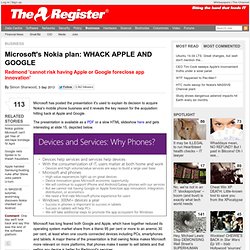
The presentation is available as a PDF or a slow HTML slideshow here and gets interesting at slide 15, depicted below. Microsoft has long feared both Google and Apple, which have together reduced its operating system market share from a titanic 95 per cent or more to an anemic 30 per cent, at least when one counts connected devices including PCs, smartphones and tablets.
A major theme of the presentation is that owning Nokia makes Microsoft more relevant on more platforms, that phones make it easier to sell tablets and that selling any device is better for Redmond's services. But fear of Google and Apple also pervades the document. Slide 24 says “Microsoft will have the most cost-effective patent arrangements for smart devices”. Microsoft and Nokia's problems - explained in three graphs. The takeover by Microsoft of Nokia's handset division, along with a licence for its patents, leaves behind two divisions that apparently the Redmond-based software company doesn't want: Location & Services (which provides the HERE maps service) and Nokia Siemens Networks (NSN), set up as a joint venture with Siemens of Germany, but now fully owned by Nokia.
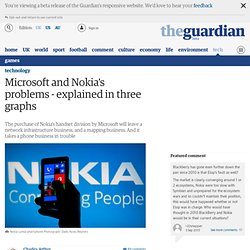
It was the takeover of NSN at the end of June which finally cleared the way for the selloff of the handset division, because it meant that the remainder of Nokia would be in charge of its destiny. But what is Microsoft getting - and what is left behind? What remains at Nokia The Location & Services division, formed from the $8bn acquisition of Navteq in 2007, generates little revenue compared to its NSN sibling. But neither generates much profit: over the past four quarters, they have generated an operating profit of just €147m. Microsoft, Nokia and the sound of colliding garbage trucks. 7 elements of radically simple OS migration Opinion History, it is said, doesn't repeat itself – there are merely echoes through time.

Listening to Microsoft's $7.1bn purchase of Nokia's phone and services, you'd have certainly heard an echo – the distant grinding noise of two colliding garbage trucks reverberating down the years. The phrase "the sound of two garbage trucks colliding" was coined by Sun Microsystems' co-founder and chief executive Scott McNealy to describe the merger of rivals Hewlett-Packard and Compaq. McNealy used it to describe the unseemly act of two elderly corporate tech giants with outdated practices and ageing products attempting a merger. Cruelly, the phrase was turned back on McNealy when his struggling Sun chucked $4.1bn at StorageTek, a giant marooned on a tape storage island as the world went digital.
With Microsoft and Nokia, we again hear the sound of rending metal. Nokia is cast as StorageTek in this latest merger. But lo! So was this a rescue deal? Microsoft - do you really think you can take on Google with Nokia? Nokia is dead. Long live Nokia! I'm sure you've heard the news.
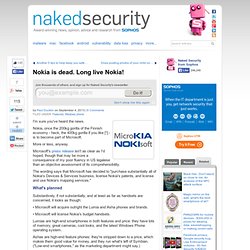
Nokia, once the 200kg gorilla of the Finnish economy - heck, the 400kg gorilla if you like [*] - is to become part of Microsoft. More or less, anyway. Microsoft's press release isn't as clear as I'd hoped, though that may be more a consequence of my poor fluency in US legalese than an objective assessment of its comprehensibility. How Nokia Employees Are Reacting to the Microsoft Takeover. Why Nokia Died: Nobody Buys Phones, Anymore - Jordan Weissmann.
Yesterday, Nokia announced the sale of its handset division to Microsoft, bringing the the brand's five-year decline to its inevitable conclusion.
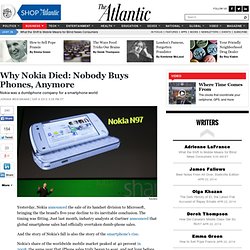
The timing was fitting. Just last month, industry analysts at Gartner announced that global smartphone sales had officially overtaken dumb-phone sales. And the story of Nokia's fall is also the story of the smartphone's rise. Nokia's share of the worldwide mobile market peaked at 40 percent in 2008, the same year that iPhone sales truly began to soar, and not long before Samsung debuted its first Android device.
Despite an impressive history of innovation—it was a pioneer in wireless infrastructure, was perhaps the first company to transform cell phones into fashion accessories, and actually created the first smartphone back in 1996— Nokia never really successfully transitioned into the new age. Before Steve Jobs & Co. effectively rethought the industry, smartphones were still essentially communications devices. Nokia's Elop Set To Receive $25 Million Bonus After Acquisition. Ex-CEO Elop's plunder to total $25m in voyage from Nokia to Microsoft. Top 5 truths about Big Data hype and security intelligence Outgoing Nokia CEO Stephen Elop will receive compensation and bonuses totaling approximately $25.4m as he departs the company for his new position at Microsoft.
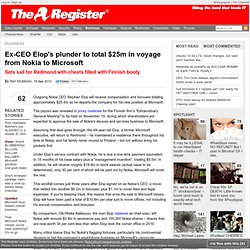
The payout was revealed in proxy materials for the Finnish firm's "Extraordinary General Meeting" to be held on November 19, during which shareholders are expected to approve the sale of Nokia's devices and services business to Microsoft. Assuming that deal goes through, the 49-year-old Elop, a former Microsoft executive, will return to Redmond – he maintained a residence there throughout his time at Nokia, and his family never moved to Finland – but not without lining his pockets first. Under Elop's service contract with Nokia, he is due a one-time payment equivalent to 18 months of his base salary plus a "management incentive", totaling $5.5m. In MASSIVE surprise, world+dog discovers Nokia checked out Android. Nokia's India threat letter: 'It's cheaper to make phones in China' High performance access to file storage Nokia’s long-running tax dispute with the Indian authorities appeared to take another turn after it was revealed that it sent the commerce ministry a strongly-worded letter branding India its “least favourable market” and threatening to move production to China.
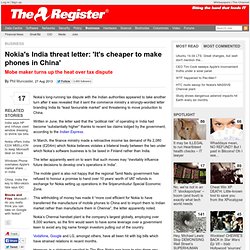
Written in June, the letter said that the “political risk” of operating in India had become “substantially higher” thanks to recent tax claims lodged by the government, according to the Indian Express. In March, the finance ministry made a retroactive income tax demand of Rs 2,080 crore (£204m) which Nokia believes violates a bilateral treaty between the two under which Nokia’s software business is to be taxed in Finland rather than India.